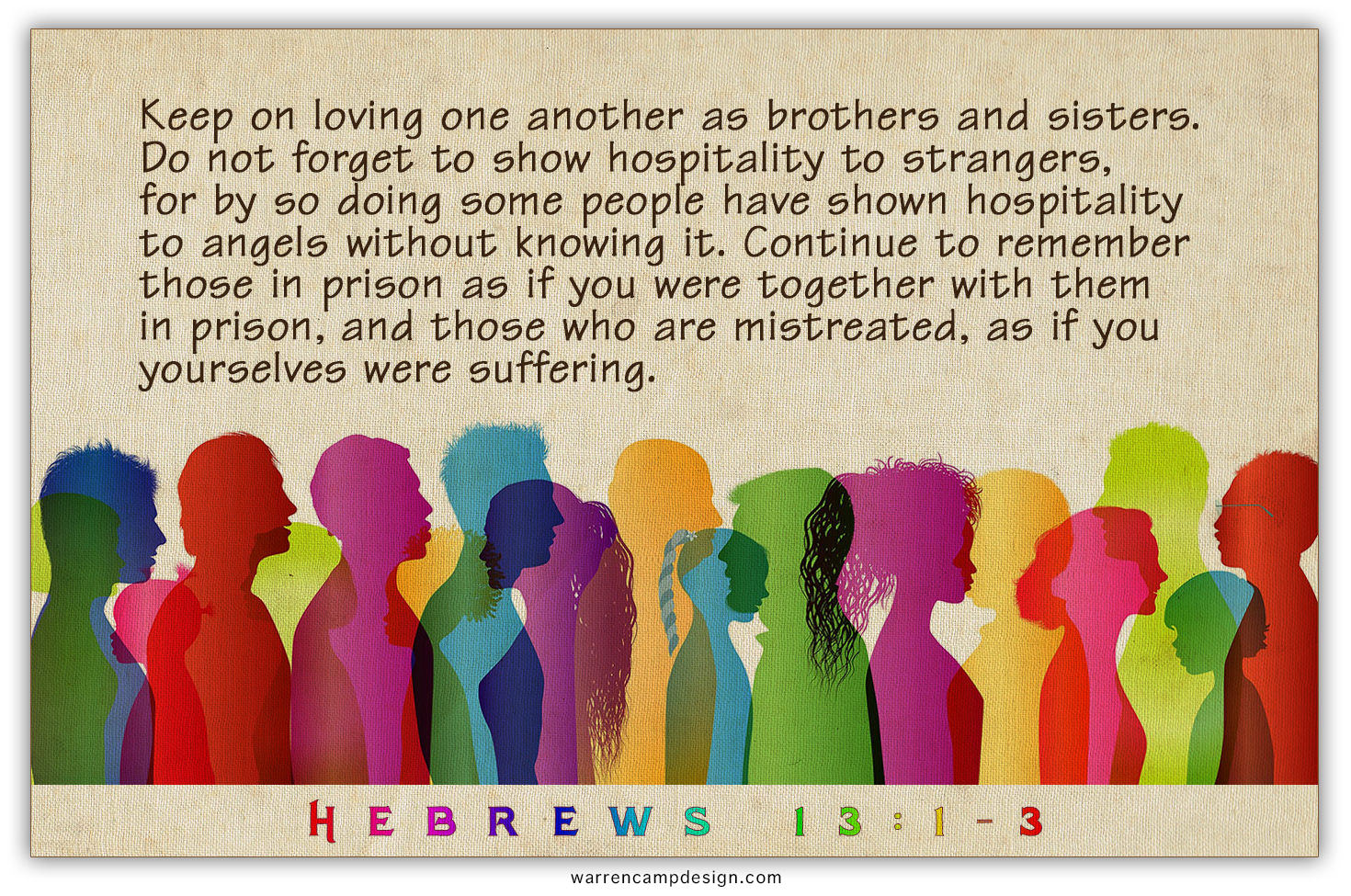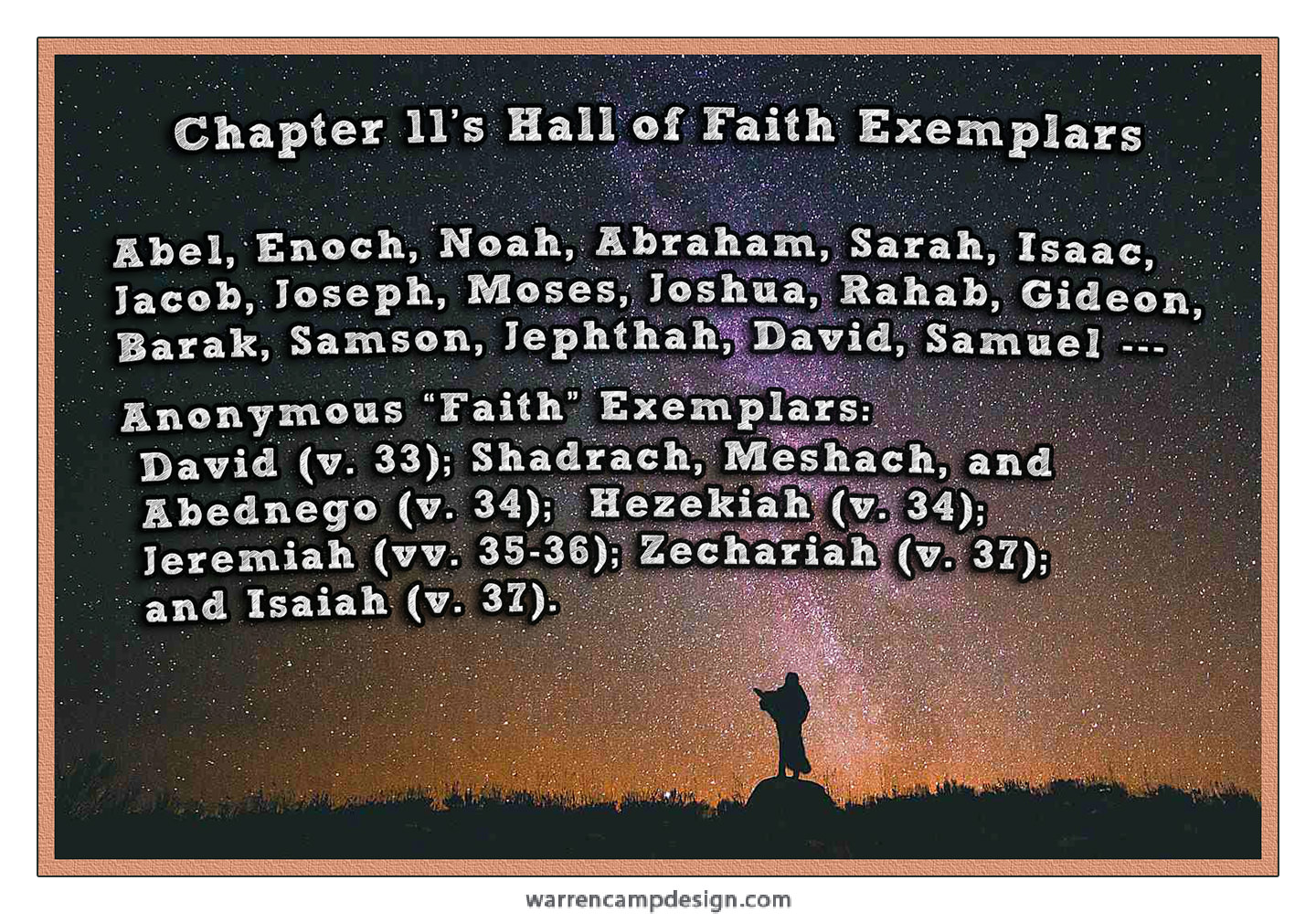Hebrews 13:1–16 . . .
“Concluding Exhortations”
As we come to chapter 13's closing passages, it's wise to recall what we reviewed in Warren's previous Bible-study commentary titled "Glorifying God in Heaven" (12:18–29). In it we saw the author comparing Mount Sinai with Mount Zion (vv. 18–21) while realizing a joyful, heavenly assembly on Mount Zion (vv. 22–24) as God's voice shook the earth and rocked the heavens (vv. 25–27). In the end, we believers have been exhorted to worship God most acceptably with reverence and awe because he's "a consuming fire" (vv. 28–29).
At this point, the author will begin to conclude his letter by offering a list of exhortations detailing to his readers the godly life that ought to naturally follow one's making a dedicated commitment to the new covenant. He first encourages his Christian audience to love and show genuine hospitality to others; in the event that a Christian brother is imprisoned, the author also exhorts his readers to support the incarcerated; he also urges his readers to remain pure and faithful in their marriages, otherwise they'll be judged and disciplined by God; he then implores readers to never covet material goods, but to be content with what they have, trusting God to provide all else.
Finally, readers are to uphold certain values so God will be pleased with them. He attempts to persuade his audience to evaluate leaders' teachings to see if they might be attempting to lure the Christians back into old-covenant bondage; they were encouraged to determine if their leaders consistently followed the gospel of Jesus Christ, obeying its principles.
Continually Express Brotherly Love (13:1–3)
Previously, this letter addressed the spiritual crisis that Jewish Christians faced. Disciples lived out their faith through spiritual tests and suffering. Cared for by Jesus, they traveled to their Promised Land, the city of the living God, approaching "God's throne of grace with confidence" (4:16a). All Christians get baptized into a covenant community where everyone worships, learns, loves, and reads God’s Word and practices it as a body of believers following one Lord, led by one Spirit. The exhortations we'll find in chapter 13 target that community of brothers and sisters who traveled together to Mount Zion.
Concluding Exhortations
13 1Keep on loving one another as brothers and sisters. 2Do not forget to show hospitality to strangers, for by so doing some people have shown hospitality to angels without knowing it. 3Continue to remember those in prison as if you were together with them in prison, and those who are mistreated as if you yourselves were suffering (13:1–3).
The first six verses contain practical, real-world instructions for Christian believers. They mirror common New Testament themes: brotherly love (Greek: philadelphia), hospitality (Gr.: philoxenia), care for the abused, sexual morality, and contentment. The New Testament routinely recognizes love for fellow Christian brothers and sisters as evidence of a person's relationship with Jesus. "Love" for a Christian means an active expression of a sincere, selfless concern for others, demonstrated by action. That is, the Bible calls on us to "show" love, not merely "feel" it. Philadelphia (Gr.), focuses on the natural love that exists between brothers and sisters in a family. There's not a significant difference between it and the more commonly used agape love. Next to faith in the Lord Jesus Christ for salvation, biblical love is the supreme mark of the Christian. It's mandatory for him and her to grow in love!
It's appropriate that v. 1's "brotherly love" exhortation should be the first. The person who loves brother and sister (broadly defined) will be hospitable, remember those in need, honor marriage, and love people instead of money. It's worth remembering that hospitality blesses both the one who gives it and the one who receives it. And, Jesus himself said, this would be the mark by which his true disciples would be known (John 13:35).
We also see in these first three verses (and the next three) exhortations concerning congregational care for one another. Under the general practice of familial love, readers are encouraged to be hospitable to strangers who might actually be angels (vv. 1–2), as well as to care for prisoners and those unjustly treated (v. 3). With the phrase "continue to remember," the author reveals his assumption that his readers already manifest brotherly love for one another; he tells them to keep up the good work. Note: The suggestion that our behavior towards strangers might be directed to angels is not a random thought. Scripture makes reference to instances where people were actual visited by angels, seemingly unaware of that angelic possibility (Genesis 18:1–15; 19:1–22).
Verse 3 completes a passage closely resembling Jesus' words in Matthew 25:31–46 where Christians have to care for the needy, strangers, and those in prison. Christians, then and today, who are being divested of freedom, rights, or property, undoubtedly deserve the support and sympathy of fellow believers. Those "in prison" and the "mistreated" are two groups of especially vulnerable people. The "mistreated" exemplifies Christian believers having a good amount of godly faith while suffering persecution and possible martyrdom. This is a major theme of "Hebrews": Believers ought to remain secure through their suffering, while caring for and supporting others who suffer for Christ's sake.
Contentment Instead of Covetousness (vv. 4–6)
The next three family-specific exhortations are designed to (1) encourage faithful marriages, since God judges the pornographer and adulterer (v. 4), and (2) resist a self-loving preoccupation with acquiring consumer goods. Instead we're exhorted to embrace our satisfaction and acceptance of a simple lifestyle, relying primarily on God’s faithfulness and the community’s mutual sharing of common possessions (v. 5). And, since God assured us that he’ll never leave us or forsake us, we can boldly declare that God is our ready helper, whenever needed (v. 6).
4Marriage should be honored by all, and the marriage bed kept pure, for God will judge the adulterer and all the sexually immoral. 5Keep your lives free from the love of money and be content with what you have, because God has said,
“Never will I leave you; never will I forsake you” [from Deuteronomy 31:6]. 6So we say with confidence, “The Lord is my helper; I will not be afraid. What can mere mortals do to me?” [from Psalm 118:6–7] (13:4–6)
Starting with v. 4, we're presented with another common New Testament teaching: the essential of sexual purity, including marriage fidelity, as well as sexual abstenance until a person marries. We are to honor marriage — our own marriage and the marriages of neighbors and co-workers. It means treating our spouse with respect while avoiding the temptation to have sex with someone other than our husband or wife. The phrase "for God will judge the adulterer and all the sexually immoral" equates to condemnation.
The author quickly exhorts his readers in v. 5 not to succumb to greed: "the love of money." An unwholesome fixation on gaining and retaining money is closely related to discontent. Rather than being discontented over what material blessings we lack, we Christians ought to be grateful for what we have, remaining confident in what we'll eventually receive, thanks to our heavenly Provider (11:14–16) who's given us many precious blessings, promising never to leave us nor forsake us, no matter the fierce bitter winds of trial battling our lives, and irrespective of those who might have betrayed or hurt us. When Apostle Paul tells us that he'd learned to be content with what he had (Philippians 4:11), we ought to see that as a prescription for happiness.
And in v. 6, believers are reasonably exhorted to trust in God, instead of being unhappy with current circumstances. The author quotes Psalm 118:6: "Yahweh is on my side. I will not be afraid. What can man do to me?" Paul later expressed the same idea: "If God is for us, who can be against us?" (Romans 8:31). In other words, If God is for us, what does it matter who is against us? True, being successful at trusting God is most difficult during a crisis; but when Father God tells us that he'll care for us and surely see that, for those who love him, everything will be good, we can be confident and remain unafraid.
Jesus Makes People Holy (vv. 7–14)
The author's exhortation to "Remember" and then "imitate" the community’s past leaders (v. 7, and on this graphic) is grounded in the apostles’ eyewitnessing of who and what Jesus had been for them. Here, the writer continues his exhortations, now with a more theological approach regarding Christian leadership.
7Remember your leaders, who spoke the word of God to you. Consider the outcome of their way of life and imitate their faith. 8Jesus Christ is the same yesterday and today and forever.
9Do not be carried away by all kinds of strange teachings. It is good for our hearts to be strengthened by grace, not by eating ceremonial foods, which is of no benefit to those who do so. 10We have an altar from which those who minister at the tabernacle have no right to eat.
11The high priest carries the blood of animals into the Most Holy Place as a sin offering, but the bodies are burned outside the camp. 12And so Jesus also suffered outside the city gate to make the people holy through his own blood. 13Let us, then, go to him outside the camp, bearing the disgrace he bore. 14For here we do not have an enduring city, but we are looking for the city that is to come (13:7–14).
These different but related exhortations in vv. 7–14 resonate with other New Testament teaching about the character and application of those who ushered the early church, following the departure of Jesus' apostles (as revealed in Acts; 1 and 2 Timothy; Titus; 2 Peter; and 2 and 3 John). The text now presents a new focus on congregational practices that emphasize the importance of spiritual leaders guiding the forward caravan of God’s people (vv. 9–16). We're told to "imitate their faith" (v. 7b). To be sure, not all church leaders are worthy of emulation; not all are faithful; we need to use discretion to consider the results of their conduct. But men and women of honest faith, whose lives outwardly reflect that faith, are worthy of respect, support, and emulation.
For us today, Lord Jesus is the same as he was thousands of years ago; going forward, he'll be that Jesus whom we knew of in the distant past (v. 8). The memorable sentence "Jesus Christ is the same yesterday and today and forever" was meant to inspire confidence. Christians, no matter if they were from Jesus' day or today, must remain secure at abiding by faith, despite hardship and persecution (3:6; 4:14; 6:18; 10:23). Knowing that God is consistent and unchanging, "yesterday and today and forever," is the crux of such trusting faithfulness.
The exhortations in vv. 9–12 are directed against the tendency of many Christians, then and today, to seek approval or status from God by eating (or refraining from eating) certain special foods. The once-held Catholic practice of eating fish on Friday would be a case in point. Calling such practices "all kinds of strange teachings," our author warns against becoming involved with such practices. Significantly, our spiritual leaders are to protect the church body against "all kinds of strange teachings" (v. 9a). Every doctrine that changes is nothing but a false doctrine. Apostle Paul reminds us of this important concept: Those who attempt to change the gospel of Jesus Christ are subject to a curse (Galatians 1:8–9). Any teaching different from what was originally given by Jesus and his apostles is false.
And v. 10's "we have an alter" reflects some of that earlier imagery. The author continues to attempt to direct one's faith to the person of Jesus, not some empty ritual. Those who insist on pursuing salvation through the old covenant "have no right" to the benefits of the new covenant's "altar." This is clear in v. 11, where reference is made to the sin offering of the Day of Atonement. Christ's sacrifice is the New Testament form of that Old Testament sin offering. The altar that we Christians have is, of course, the cross of Jesus.
And the appeal is made again: "Let us, then, go to him outside the camp, bearing the disgrace he bore" (v. 13). The word for "disgrace" is the same word used of Moses (see 11:26) who chose to bear reproach for the sake of Christ. The "camp" is the religious establishment, whether of Judaism or a distorted Christianity. Going outside that camp doesn't necessarily mean a physical withdrawal. It refers more to the inner attitude that sees no value in religious ritual and dietary restrictions. It looks directly to the promises of the new covenant that provide personal strength by which to live.
Regarding "here we do not have an enduring city, but we are looking for the city that is to come," this verse illuminates the point that, for the Christian, everything on earth is temporary, including suffering. Our city here, today, isn't our home (11:16). The difficult job of "bearing the disgrace he bore" is easier when we remember that the city or society from which we're cast out is only temporary. Therefore, we're to "look for" and belong to the permanent city that's yet to come (v. 14).
Our Sacrifice of Praise (vv. 15–16)
In effect, the author tells us in vv. 15–16: Let’s take our place outside with Jesus, no longer pouring out the sacrificial blood of animals but pouring out sacrificial praises from our lips to God in Jesus’ name. Make sure you don’t take things for granted and go slack in working for the common good; share what you have with others. God takes particular pleasure in acts of worship — a different kind of "sacrifice" — that take place in the church, the workplace, and out on the streets.
15Through Jesus, therefore, let us continually offer to God a sacrifice of praise — the fruit of lips that openly profess his name. 16And do not forget to do good and to share with others, for with such sacrifices God is pleased (13:15–16).
This passage's two closing verses tell us how our love for God and our love for neighbors need to be prioritized. Although the Jewish Law required animal sacrifices as a ritualistic expression of devotion to God, our author offers an even more powerful way for us to express our devotion to God. He calls it "a sacrifice of praise" to God, and declares that it should be a continual sacrifice, rather than something that is offered only occasionally. He clarifies this by telling us that the sacrifice involves "the fruit of lips that openly profess his name" (v. 15). He immediately adds this encouragement: "Do not forget to do good and to share with others, for with such sacrifices God is pleased" (v. 16).
Believers are expected to offer a sacrifice, but it's to be one of praise, not animals or materials. And praise isn't the only sacrifice that pleases God. Praise and worship are important, but a Christian’s obligation doesn't end there: We also please God with sacrifice when we "do good and share with others." Doing good to and for others is a natural, expected part of this joyous, pleasing perspective.
- Q. 1 What do you learn and appreciate about Jesus Christ, after reading v. 8?
- Q. 2 What are we (1) always to do and (2) never forget (vv. 15–16)?
Hebrews 13:1–16
New International Version (NIV) or view it in a different version by clicking here.
— Listen to chapter 13, narrated by Max McLean.







